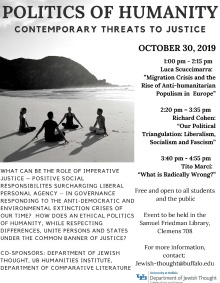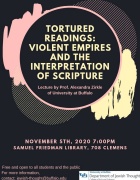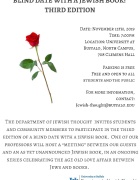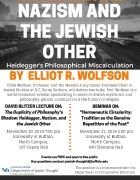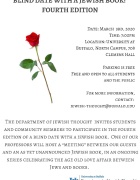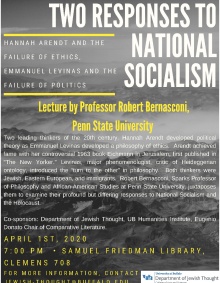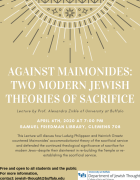2019-2020 Events
Join our mailing list to receive regular updates on departmental news and events!
“Two Enemies and an Unfathomable Story: Sarah Kofman and Jaques Derrida on Religion, Literature and the Fetish.”
Lecture by Professor Sarah Hammerschlag
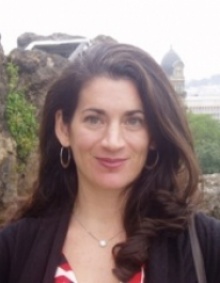
Date: Wednesday, October 2, 2019
Time: 4:00pm
Location: 306 Clemens Hall
This event is being co-sponsored with The Department of English
Sarah Hammerschlag is a scholar in the area of Religion and Literature. Her research thus far has focused on the position of Judaism in the post-World War II French intellectual scene, a field that puts her at the crossroads of numerous disciplines and scholarly approaches including philosophy, literary studies, and intellectual history. She is the author of The Figural Jew: Politics and Identity in Postwar French Thought (University of Chicago Press, 2010) and Broken Tablets: Levinas, Derrida and the Literary Afterlife of Religion (Columbia University Press, 2016) and the editor of Modern French Jewish Thought: Writings on Religion and Politics (Brandeis University Press, 2018). The Figural Jew received an Honorable Mention for the 2012 Jordan Schnitzer Book Award, given by the Association of Jewish Scholars, and was a finalist for the AAR’s Best First Book in the History of Religions in 2011. She has written essays on Jacques Derrida, Emmanuel Levinas and Maurice Blanchot which have appeared in Critical Inquiry, Jewish Quarterly Review and Shofar, among other places. She is currently working on a manuscript entitled “Sowers and Sages: The Renaissance of Judaism in Postwar Paris.”
"Politics of Humanity: Contemporary Threats to Justice"
Mini Conference
Date: Wednesday, October 30, 2019
Time: 1:00pm - 6:00pm
Location: Samuel Friedman Library, 708 Clemens Hall
This event will be co-sponsored with UB Humanities Institute and The Department of Comparative Literature.
The event will examine the all-important impact of ethics - more specifically of justice - on politics in our contemporary situation. While respecting cultural and historical differences, an ethical politics unites persons within and between countries, and regulates the powers of governance in the name of universal justice. This event will be co-sponsored with UB Humanities Institute.
Presentation of Papers:
- 1:00 - 2:15pm Luca Scuccimarra: ”Migration Crisis and the Rise of Anti-humanitarian Populism in Europe”
- 2:20 – 3:35pm Richard Cohen: “Our Political Triangulation: Liberalism, Socialism and Fascism”
- 3:40 - 4:55pm Tito Marci: “What is Radically Wrong?”
Speakers:
- Luca Scuccimarra, Professor of Political Science, Chair of Department of Political Science, University of Rome, La Sapienza, Italy
- Richard A. Cohen, Professor of Jewish Thought and Philosophy, Department of Jewish Thought, University at Buffalo
- Tito Marci, Professor of Political Science, Department of Political Science, Dean of Faculty of Political Sciences, Sociology, Communication, University of Rome, La Sapienza, Italy
"Tortured Readings: Violent Empires and the Interpretation of Scripture."
LECTURE BY PROFESSOR ALEXANDRA ZIRKLE
Date: Tuesday, November 5th, 2019
Time: 7:00pm
Location: Samuel Friedman Library, 708 Clemens Hall
This lecture will explore how in both a nineteenth-century German context and a twenty-first century US context, scriptural hermeneutics have been weaponized to justify imperial violence against religious minorities.
"Blind Date with a Jewish Book: Third Edition"
Date: Tuesday, November 12, 2019
Time: 7:00pm
Location: Samuel Friedman Library, 708 Clemens Hall
Our professors will host a “meeting” between our guests and an unannounced Jewish book, in the hope that we shall all meet again for a second date (with a different book!)
Professor Elliot Wolfson Visits UB!
Elliot Wolfson is a professor and the Marsha and Jay Glazer Endowed Chair in Jewish Studies at U.C. Santa Barbara. Elliot Wolfson received bachelor and master of Arts degrees from Queens College of the City University of New York, where he pursued the study of philosophy, focusing especially on phenomenology, hermeneutics, and existentialism. He received master of arts and doctor of philosophy degrees from Brandeis University, where he specialized in the study of the Kabbalistic texts and traditions that have remained central to his scholarly work. He was the Abraham Lieberman Professor of Hebrew and Judaic Studies at New York University, where he taught between 1987 and early 2014.
DAVID BLITZER LECTURE SERIES
Book discussion of his most recent book: "The Duplicity of Philosophy's Shadow: Heidegger, Nazism, and the Jewish Other"
Date: Wednesday, November 20, 2019
Time: 7:00pm
Location: 107 Capen Hall
Seminar: "Hermeneutic Circularity: Tradition as the Genuine Repetition of the Past"
Date: Thursday, November 21, 2019
Time: 5:00 pm
Location: 640 Clemens Hall
This event will be co-sponsored with The Department of Comparative Literature.
"Blind Date with a Jewish Book: Fourth Edition"
Date: Tuesday, March 3, 2020
Time: 7:00pm
Location: Samuel Friedman Library, 708 Clemens Hall
Our professors will host a “meeting” between our guests and an unannounced Jewish book, in the hope that we shall all meet again for a second date (with a different book!)
Professor Heidi Ravven Hosts Two Events!
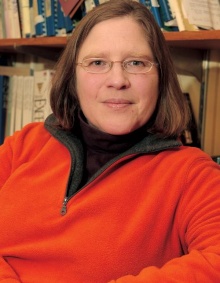
Lecture titled: "Discoveries in Brain Science and New Ethical Challenges: What Can Spinoza Teach Us?"
Date: Monday, March 23rd, 2020
Time: 7:00pm
Location: TBD
Lecture titled: "Spinoza and the Remaking of American Civil Religion: Insights from the Jewish Philosophical Tradition and the New Brain Sciences."
Date: Tuesday, March 24th, 2020
Time: 12:30pm
Location: TBD
These events will be co-sponsored with The Harold J. and Arlyne G. Levy Lecture and Conference Fund UB Humanities Institute .
Professor Heidi M. Ravven, of Hamilton College, is a specialist on the philosophy of the seventeenth century Jewish philosopher, Baruch Spinoza. She was the first philosopher to propose that Spinoza anticipated central discoveries in the neuroscience of the emotions. Ravven has published widely on Spinoza's philosophic thought, on the twelfth century philosopher Moses Maimonidea, on free will and the new brain sciences, and on Jewish ethics.
“Two Responses to National Socialism: Hannah Arendt and the Failure of Ethics, Emmanuel Levinas and the Failure of Politics”
Lecture by Professor Robert Bernasconi
Date: Wednesday, April 1, 2020
Time: 7:00pm
Location: Samuel Friedman Library, 708 Clemens Hall
This event will be co-sponsored with UB Humanities Institute.
Professor Robert Bernasconi, Edwin Erle Sparks Professor of Philosophy and African American Studies, Penn State University, is one of the world’s most distinguished scholars of the thought of Jacques Derrida and of Emmanuel Levinas, and a leading scholar in African-American Studies. Besides editing three academic journals (Eco-ethica, Levinas Studies, and Critical Philosophy of Race), and having co-edited several scholarly books, and authored two books on Heidegger and a book on Jean-Paul Sartre (which has been translated into Korean and Chinese), he has published numerous articles and delivered numerous papers and keynote addresses in America and around the world in contemporary thought.
Hannah Arendt, beyond her worldwide reputation as a philosopher and political commentator, is a recognized Jewish intellectual and political thinker owing to the impact of her controversial 1963 book Eichmann in Jerusalem, which was first published serially in “The New Yorker” in the same year. Emmanuel Levinas, also a recognized world-class philosopher, though lacking Arendt’s recognition in the Jewish community, is also a major Jewish intellectual, and recognized as such in France and Europe more generally. Beyond this recognition in his own religious community, his reputation is ensured as the foremost European philosopher of ethics in the 20th century, having reoriented philosophy radically toward establishing “ethics as first philosophy.”
"Against Maimonides: Two Modern Jewish Theories of Sacrifice."
LECTURE BY PROFESSOR ALEXANDRA ZIRKLE
Date: Monday, April 6th, 2020
Time: 7:00pm
Location: Samuel Friedman Library, 708 Clemens Hall
This lecture will show how Ludwig Philippson and Heinrich Graetz countered Maimonides’ accommodationist theory of the sacrificial service and defended the continued theological significance of sacrifice for modern Jews—despite their disinterest in re-building the Temple or re-establishing the sacrificial service.
